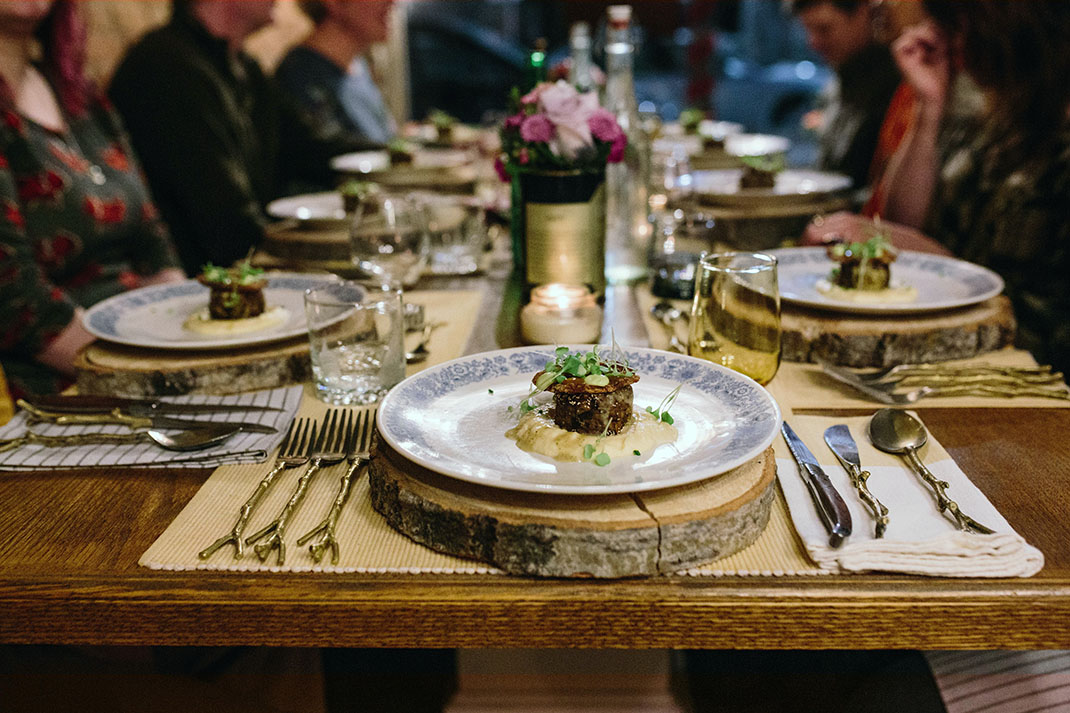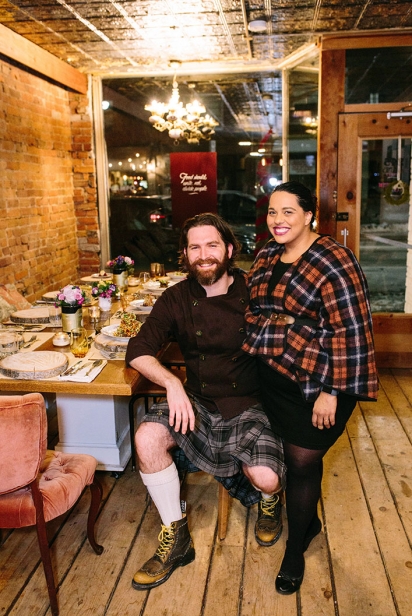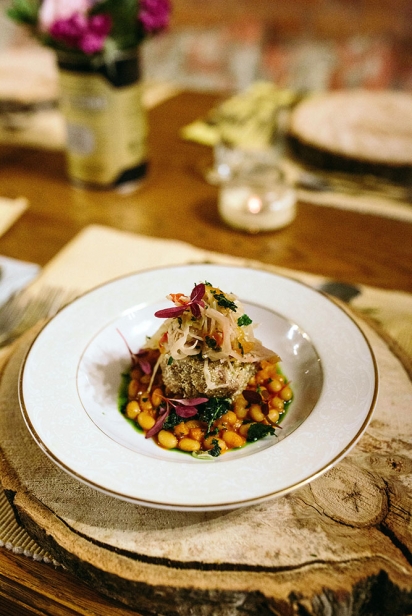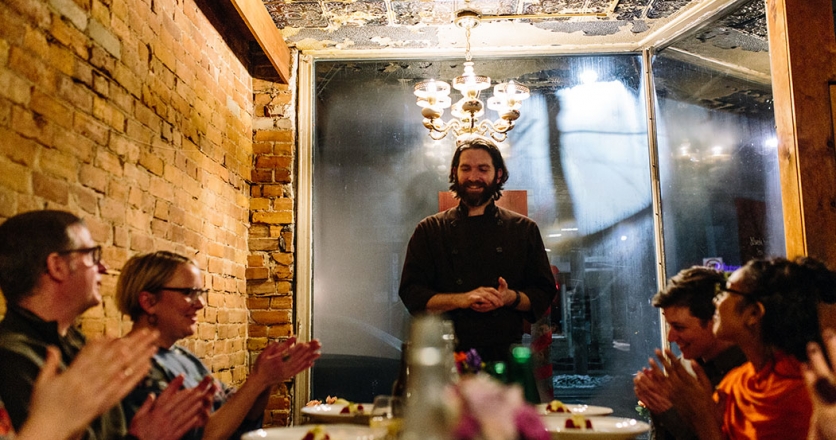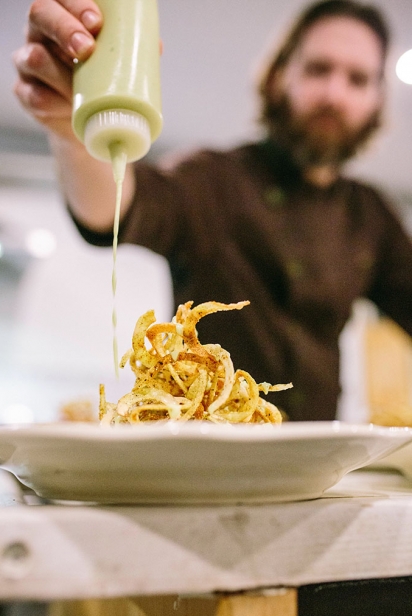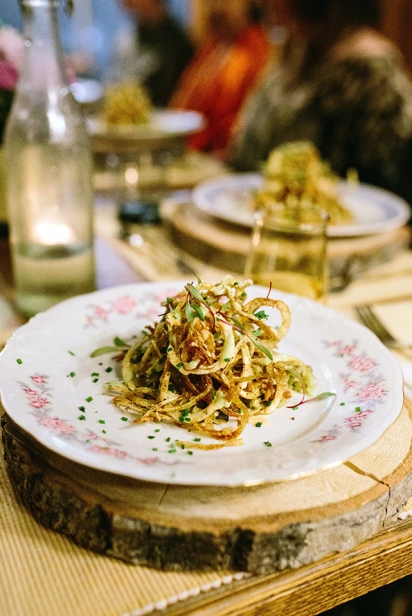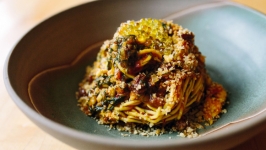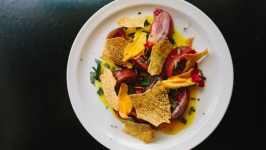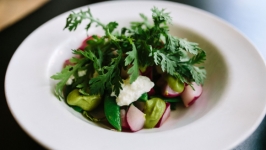A Supper Club for All
Guests of Urban Acorn's supper club are immediately met with a bright, warm charm when they enter the caterer's tasting room, on Jane Street, just north of Bloor. There is chatter and laughter. It feels like a private dinner party, but in reality, most of the diners don't know each other at all.
The room accommodates 16 guests. While they begin as strangers, nothing brings people together quite like a couple of hours spent over an elegant, but unfussy meal and, well, the lubrication of alcohol. These 16 strangers end up talking about all sorts of things you aren't supposed to talk about: parenthood, politics and career goals. As the courses continue to arrive and the beer warms spirits, laughter spills out into the street at the end of the meal.
The supper club is run by Marie Fitrion and Daniel Holloway, the husband-and-wife team behind Urban Acorn, a catering company. The Urban Acorn supper club happens to be vegan, but that's secondary to what the couple does best: Brings people together using food as social glue.
"The supper club is a social experiment. Guests buy their tickets knowing the menu ahead of time," Fitrion explains. "They know it's vegan and they know it's prix-fixe." As for the social experiment? "They show up and they sit next to strangers."
That is the essence of any supper club. Maybe you've heard of them or been to one. It's an event that brings like-minded strangers together at a table, where a talented chef whips up a few courses at a reasonable price.
It's often BYOB, as is the case with Urban Acorn's (the evening I attended was an exception, as they joined forces with a local brewery to offer pairings). It's not a restaurant and it's not a private dinner party — it's somewhere in between. Sometimes they're in an underground, clandestine setting, giving them the allure of mischief.
Prohibition-era roots
It's possible to trace back early versions of supper clubs to prohibition-era Wisconsin, where out-of-the-way restaurants hosted prix-fixe menus, providing illicit booze under the table — literally. Proximity to the Canadian border granted access to liquor and the remoteness of the restaurants made it unlikely authorities would interrupt the fun.
These days, there are many above-board supper clubs, like Urban Acorn's vegan version.
The club dinners are a way for the caterers to show off their ability to impress a diverse crowd — one that includes omnivores and long-time vegans — with refined, complex, surprising meals that are entirely plant-based.
Holloway is a French-trained chef and he carries that training with him into vegan cuisine. "You can have it look avant-garde, fancy, refined," Fitrion says, "but still really comfortable for the guest."
Henriette Carmichael is a returning guest who has been eating a vegan diet for several years. In her experience, vegan restaurants tend toward comfort food.
"Toronto chefs are doing an amazing job of transforming mainstream dishes and comfort foods into vegan versions. I do enjoy this type of food; however, I am especially interested in healthy plant-based food creations that have interesting new flavours, textures and colours," Carmichael says.
Holloway and Fitrion offer the latter and it's what keeps Carmichael and her husband, Jeff, coming back. "I enjoy savouring the innovations and creations of a highly trained chef. In my opinion, a chef who can create interesting flavourful food using plants demonstrates his skill, versatility and creativity," she adds.
Each monthly dinner has a playful theme.
For instance, "Voodoo Haggis' was January's theme — an ode to Fitrion and Holloway's Haitian and Scottish heritage. It included a course of Scotch egg-style fried callaloo, Makawoni gratin, kidney bean purée with Pikliz and Scotsman breakfast beans.
The dinner I attended was on the theme of Oktoberfest and included beer pairings from Toronto's Junction Craft Brewing. Holloway and Fitrion skillfully distilled the essence of traditional German cooking — notoriously meat and dairy heavy — using only plants. On the menu were five courses of deeply satisfying, beer-absorbing fare with a fine-dining edge. All courses impressed and the highlight, at least for me, was the chickwheat and beet roulade served with lemon poppyseed spaetzle with butternut squash, black trumpets and Northern white beans. I loved slicing into the seared beet roulade to reveal a stunning pink colour.
Flexitarian versus vegan
While the supper club dinners are 100 per cent vegan, Fitrion, Holloway and their three kids are not and neither is Urban Acorn catering, strictly speaking. They define themselves as flexitarian. Inclusivity, regardless of dietary choices or restrictions, is a foundation of their business as caterers.
Fitrion says she first heard of flexitarianism while reading Michael Pollen's Food Rules. In his book, Pollen "describes a flexitarian as a person who eats a mostly plant-based diet full of nuts, seeds and legumes, but consumes meat, fish and other animal proteins from time to time," she says. Coming from meat- and starch-heavy cultures, her family has adopted flexitarianism to create better balance nutrition-wise, while still allowing themselves to indulge in dishes from their childhood, she adds.
"The end result — we don't need to eat meat or animal products at every meal, but when we do, we can purchase better quality items," Fitrion explains. "This quality over quantity trade-off also applies to how I source ingredients for the catering side."
In contrast with flexitarianism, veganism excludes animal products entirely. The Vegan Society is the movement's oldest organization, founded in 1944 by a British animal rights activist Donald Watson. The society's definition of veganism is a "way of living, which seeks to exclude, as far as is possible and practicable, all forms of exploitation of, and cruelty to, animals for food, clothing or any other purpose."
The degree to which a vegan considers the exclusion practical can vary. For instance, some vegan gardeners may opt out of using manure, using pure plant compost instead.
A meal for all to enjoy
"Catering is all about making a client's guests feel welcome. And you can't feel welcome if you don't feel represented in the food," Fitrion says. Many caterers, she adds, use meat as a centrepiece of the meal, building extras around the meaty main. This often makes vegan and vegetarian accommodations a secondary consideration in menu planning. From Fitrion's viewpoint, this is no way to make guests feel welcome or cherished.
"If you're a vegan guest at a wedding and the person next to you is enjoying and elaborate meal and you're staring down at your eggplant parmesan with the parmesan scrapped off, it doesn't feel good."
So instead of building from an animal-based main, Urban Acorn works with its catering customers to build a vegan menu first, and then adds non-vegan components, if that is something the customer wants.
"I look at vegan [foods] as the easiest way for everyone to enjoy the meal," Fitrion explains. If quality and care has gone into a plant-based meal, vegans and non-vegans can all enjoy a meal together. "You can take away my meat, you can take away my dairy. It's really about focusing on what you're adding… and that's craftsmanship and dedication."
Dinner winds down and we enjoy the dessert German-style black forest cake made with Ontario cherries, grated fresh cocoa, Swiss buttercream and chocolate ganache. Holloway is finally able to take his apron off, sit down and enjoy some food with us. We all have questions… how did you make the vegan fondue so cheesy? Why did the beet roulade have such great texture? How did you know this beer would go so well with dessert? He graciously answers our questions, elucidating his thought process in the creation of the evening's menu.
The supper club serves as a showcase for Holloway's skill, and as Fitrion floats from seat to seat, topping up glasses while chatting and checking in, guests get a sense of who this couple is and their broader philosophy.
In Fitrion's words, "If we can find common ground with food, we can bridge that gap and make everyone feel comfortable."
Acorn Urban Catering
245 Jane St., Toronto, Ont.
urbanacorn.ca | 647.348.3000 | @urbanacornca


